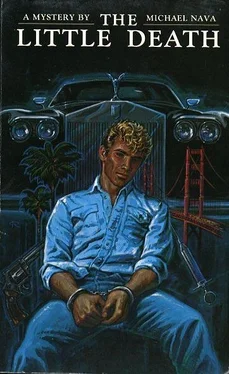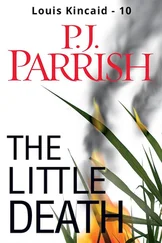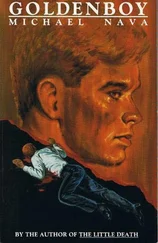Michael Nava - The Little Death
Здесь есть возможность читать онлайн «Michael Nava - The Little Death» весь текст электронной книги совершенно бесплатно (целиком полную версию без сокращений). В некоторых случаях можно слушать аудио, скачать через торрент в формате fb2 и присутствует краткое содержание. Жанр: Криминальный детектив, на английском языке. Описание произведения, (предисловие) а так же отзывы посетителей доступны на портале библиотеки ЛибКат.
- Название:The Little Death
- Автор:
- Жанр:
- Год:неизвестен
- ISBN:нет данных
- Рейтинг книги:5 / 5. Голосов: 1
-
Избранное:Добавить в избранное
- Отзывы:
-
Ваша оценка:
- 100
- 1
- 2
- 3
- 4
- 5
The Little Death: краткое содержание, описание и аннотация
Предлагаем к чтению аннотацию, описание, краткое содержание или предисловие (зависит от того, что написал сам автор книги «The Little Death»). Если вы не нашли необходимую информацию о книге — напишите в комментариях, мы постараемся отыскать её.
The Little Death — читать онлайн бесплатно полную книгу (весь текст) целиком
Ниже представлен текст книги, разбитый по страницам. Система сохранения места последней прочитанной страницы, позволяет с удобством читать онлайн бесплатно книгу «The Little Death», без необходимости каждый раз заново искать на чём Вы остановились. Поставьте закладку, и сможете в любой момент перейти на страницу, на которой закончили чтение.
Интервал:
Закладка:
As I drank my coffee, I wondered who there was to mourn Aaron. His law firm associates? A few ex-girlfriends? He had family in L.A. that he had spoken of maybe twenty times in all the years I’d known him. After all those years and all the people he’d known, I probably was still his closest friend. It disturbed me to think that he’d gone through life so alone. That image of opulent self-worth that he projected to the world was shadow play. My grief was real.
I needed to think, but the effort was painful; all the easy connections between Hugh’s death and Aaron’s led to a dead man, the judge. But there it was. Aaron had information he wanted to share with me about Hugh’s death. The man who broke into my house was also interested in that information — not gaining access to it — but suppressing it. He also had taken the only proof I had linking Robert Paris to his grandson’s death, so I’d assumed that Aaron’s information further implicated the judge. But the judge was dead. What difference would it make to anyone whether his reputation was ruined?
And then it came to me. No one cared about the judge at this point. The break-in and Aaron’s murder were the acts of someone with something left to lose should it become public knowledge that the judge had arranged his grandson’s death. And who was that someone? Hugh’s actual killer — the man or men hired by the judge to carry out the murder. Robert Paris’s death hadn’t really solved the crime. Hugh’s murderer was still at large and I believed that that person was more than a goon employed for the occasion but someone upon whom the judge had relied pretty often. Who would know about the inner workings of Paris’ staff? Only a peer who had frequent dealings with that staff. John Smith.
And who was John Smith?
I had done a little research on Smith, gleaning the few facts I knew about him from the back issues of the Chronicle and my conversations with Grant. He was eighty-one years old, unmarried, a banker by profession, and something of a philanthropist. Four months out of the year he lived in Geneva where he was associated with various banks headquartered there. He was also chairman of the Linden Trust and, by virtue of his control of the disbursements of that fund, was more responsible for the development and course of nuclear research than any other private citizen. He gave money to Catholic charities, had had a rose named in his honor, had never graduated from college. In virtually every respect his life was opposite that of his brother-in- law, Robert Paris. Yet Smith, who lived in relative anonymity, was by birth something that Robert Paris never became, a member of the American aristocracy.
Nor, apparently, did the two men like each other. There was never anything as obvious as a public falling out. As stewards of the Linden fortune, their economic interests frequently converged and were too important to allow personal feelings to stand in the way of greater enrichment. Nonetheless, Grant had spoken as if the enmity between the two ancient tycoons was public knowledge.
All this made Smith a potential ally. Someone in Robert Paris’s retinue had killed Hugh and Aaron. I could not interest the police in pursuing the investigation but Smith, with his money and influence, could. What remained was to make an appeal to him. I needed entree into his world. Once again I would have to rely on Grant Hancock whose family, though perhaps poorer, was as distinguished as Smith’s.
I picked up the phone and dialed Grant’s number.
Grant was at work. I reached his secretary who made it clear to me that unless I was a paying client I could leave a message. Finally, after lengthy negotiation, she agreed to give Mr. Hancock my name. He was on the phone a moment later.
“Henry, I was going to call you. I just heard a very disturbing rumor about Aaron from one of our classmates who was working on a case with him.”
“It’s true, Grant. Aaron’s been murdered.”
“Jesus.”
“And I was arrested for his murder and spent half the night in jail.”
“What?”
“And the same day he was murdered, someone broke into my apartment and stole the letters that Hugh had written to his grandfather. Aaron called my apartment while the break-in was in progress. He said he had information about Hugh’s death. Whoever was in my apartment — and I think it was Hugh’s killer — heard the phone message and tried to erase it. Then the killer went to Aaron’s. When I got to Aaron’s house, he was dead.”
“Wait — Hugh’s killer killed Aaron? The judge killed Hugh.”
“No, the judge had Hugh killed. An important distinction, Grant. The man who did the actual killing is still at large and probably in a panic since the death of his employer.”
“Didn’t you also just say you’d been arrested for Aaron’s murder?”
“Yes.”
“How did that happen?”
“I was holding the gun.” I heard Grant make a noise, and I explained how it was I came to be at Aaron’s house when the police arrived. I also told him that the police were treating the case as a burglary and that the district attorney considered any other interpretation of the events leading to Aaron’s death unprovable.
“But you think differently.”
“Yes.”
“I was afraid of that. I take it, then, this is not a social call.”
“Grant, I’ve respected your wish to be left out of this, until now.”
“Is that the sound of chips being cashed I hear?” he said.
“The police are prepared to write off Aaron’s death the same way they wrote off Hugh,” I continued, ignoring his joke. “I want to make contact with John Smith.”
“You’re obsessed with Smith,” Grant said. “He’s just a private citizen — albeit a rich one.”
“Money makes things happen,” I replied, “and if even you feel intimidated by John Smith, imagine his effect on a chief-of- police. Or the mayor.”
There was a thoughtful silence on the line.
“First,” Grant said, “you’ll have to engage his attention.”
“All I want is my foot in the door.”
“I’m going to put you on hold,” Grant said, and the line went blank. Five minutes later he came back on. “Sorry,” he said, “I had to make a call. I want you to call this number and ask for Peter Barron. He’s one of Smith’s aides at Pegasus.”
“At what?”
“Pegasus. Smith’s corporate flagship. A holding company.”
He gave me the number. I thanked him. We hung up.
A company that owns companies. That’s how Terry Ormes had described the corporation that held title to the house in San Francisco that Hugh had leased and was living in at the time of his death. Pegasus Corporation.
I dialed the number Grant had given me.
“Good morning. Mr. Barron’s office,” a woman said.
“Is Mr. Barron in?”
“Yes. Who may I say is calling?”
“Henry Rios.”
“May I tell Mr. Barron what this call is in reference to?”
“Hugh Paris,” I replied.
“One moment.” I was back on hold.
“Good morning, Mr. Rios,” a male voice said. For the briefest moment I thought I recognized the voice.
“Mr. Barron? I’m a friend of Grant Hancock. He gave me your number-”
“How is Grant?”
“He’s fine. Look, I have some information about Hugh Paris’s death that I think might interest your employer, Mr. Smith.”
“Such as?”
“Hugh was murdered at the direction of his grandfather, Robert Paris, and whoever performed the killing is still at large.”
There was a long skeptical pause. “I see,” he said finally. “Have you shared this information with the police?”
“The police take the position that Hugh’s death was accidental.”
“Oh, is that the position the police take?” His tone was mocking. Once again, his voice sounded familiar. “Well, Mr. Rios, I doubt that Mr. Smith is in any position to do what the police can’t or won’t do. He was deeply affected by Hugh’s death, and I think, at his age, he should be spared these speculations which would only make Hugh’s loss harder to accept.”
Читать дальшеИнтервал:
Закладка:
Похожие книги на «The Little Death»
Представляем Вашему вниманию похожие книги на «The Little Death» списком для выбора. Мы отобрали схожую по названию и смыслу литературу в надежде предоставить читателям больше вариантов отыскать новые, интересные, ещё непрочитанные произведения.
Обсуждение, отзывы о книге «The Little Death» и просто собственные мнения читателей. Оставьте ваши комментарии, напишите, что Вы думаете о произведении, его смысле или главных героях. Укажите что конкретно понравилось, а что нет, и почему Вы так считаете.












